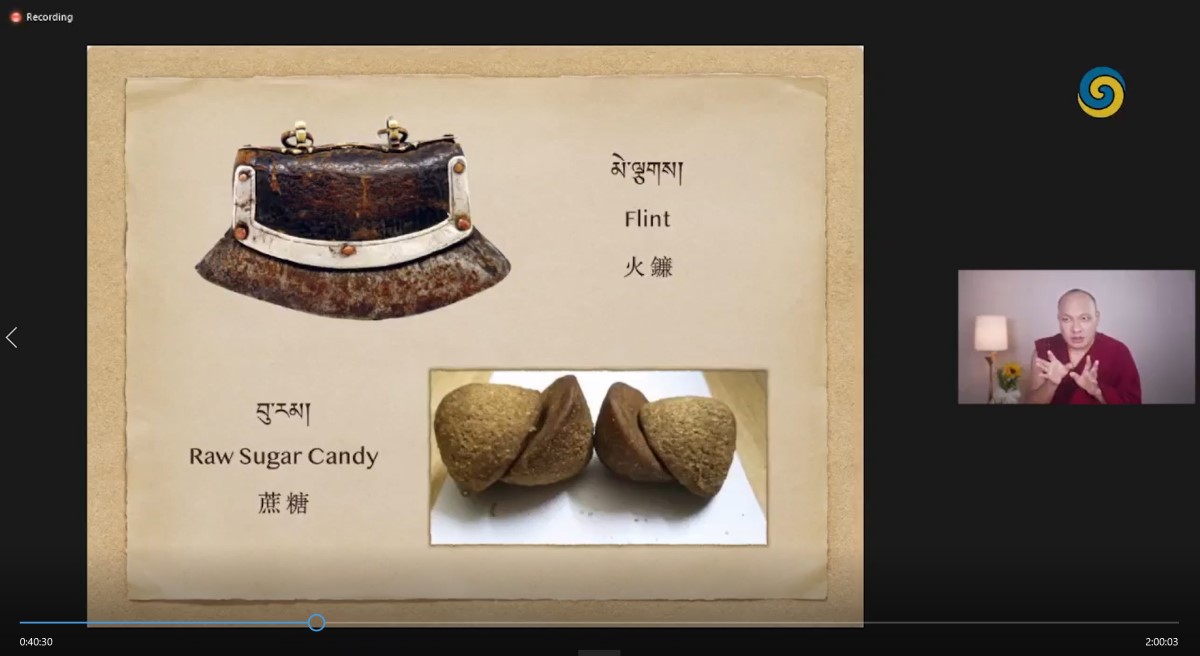法王新闻 | 2022年04月
『第7届谶摩春季』噶玛巴米觉多杰自传•第九天第一堂课
『7th Arya Kshema』AUTOBIOGRAPHICAL VERSES OF KARMAPA MIKYÖ DORJE• 9-1
རྗེ་བཙུན་མི་བསྐྱོད་རྡོ་རྗེའི་རྣམ་ཐར། བདེ་བྱེད་མའི་དཔྱིད་ཆོས། ཉིན་དགུ་པ།

時間:2022年04月08日 08th April, 2022 21:00-22:00(北京时间)
米拉日巴尊者圆寂时示现的神通力
本来4月5日是有课的。4月4日大宝也没说明天不上课。但因为那天是Bamboo的生日,所以一早就看见那个背后不知道是谁在经营的facebook Karmapa账号贴出“法王需要休息,停课一天的告示。” 怪不得4月4日时,看大宝的眼神有些哀伤。不过生日那天能休息一下,不用忙着转播和记录。对Bamboo来说也是蛮好的。
首先问候大家好。今天是谶摩春季课程的第9堂课,今天会讲的是法王米觉多杰《妙行解脱自传》的第17个颂文。
His Holiness began the ninth day of the Arya Kshema Spring teachings with an explanation on the seventeenth good deed from Mikyö Dorje’s Autobiographical Verses “Good Deeds.”
依据侍者桑杰巴珠撰写的注解提到的科判,“观修世俗菩提心”分为“座上”和“座下”两个部分。
According to the outline from the commentary by the attendant Sangye Paldrup, the passage on meditating on relative bodhicitta has two parts: (a) Exchanging oneself for others in meditation;(b) Taking adversity as the path in post-meditation.
现在讲到的是“座下:转恶缘为道用”的部分,其中有10个部分。其中
The second part has ten different sub-topics,
རྗེས་ཐོབ་རྐྱེན་ངན་ལམ་འཁྱེར།
Taking adversity as the path in post_meditation
座下:转恶缘为道用
- ལོངས་སྤྱོད་ཆུད་འཛའ་བ་ལམ་འཁྱེར།
Taking running out of supplies as the path
转耗尽物资为道用 - གནོད་པ་ལམ་འཁྱེར།
Taking harm as the path
转伤害为道用 - སྨྲ་བརྗོད་ལམ་ཁྱེར།
Taking speech as the path
转言语为道用 - སྙན་གྲགས་ལམ་ཁྱེར།
Taking pleasing words as the path
转名声为道用 - སྡུག་བསྔལ་ལམ་འཁྱེར།
Taking suffering as the path
转痛苦为道用 - ལྷག་བསམ་གྱི་ཕན་བདེ་ལམ་འཁྱེར།
Taking the benefit and happiness of good intentions as the path
转清净心之利乐为道用
这6个讲过了。今天讲的是第7个“转清净行为为道用”。颂文是:
and we have arrived at the seventh—taking acting upon good intentions as the path.
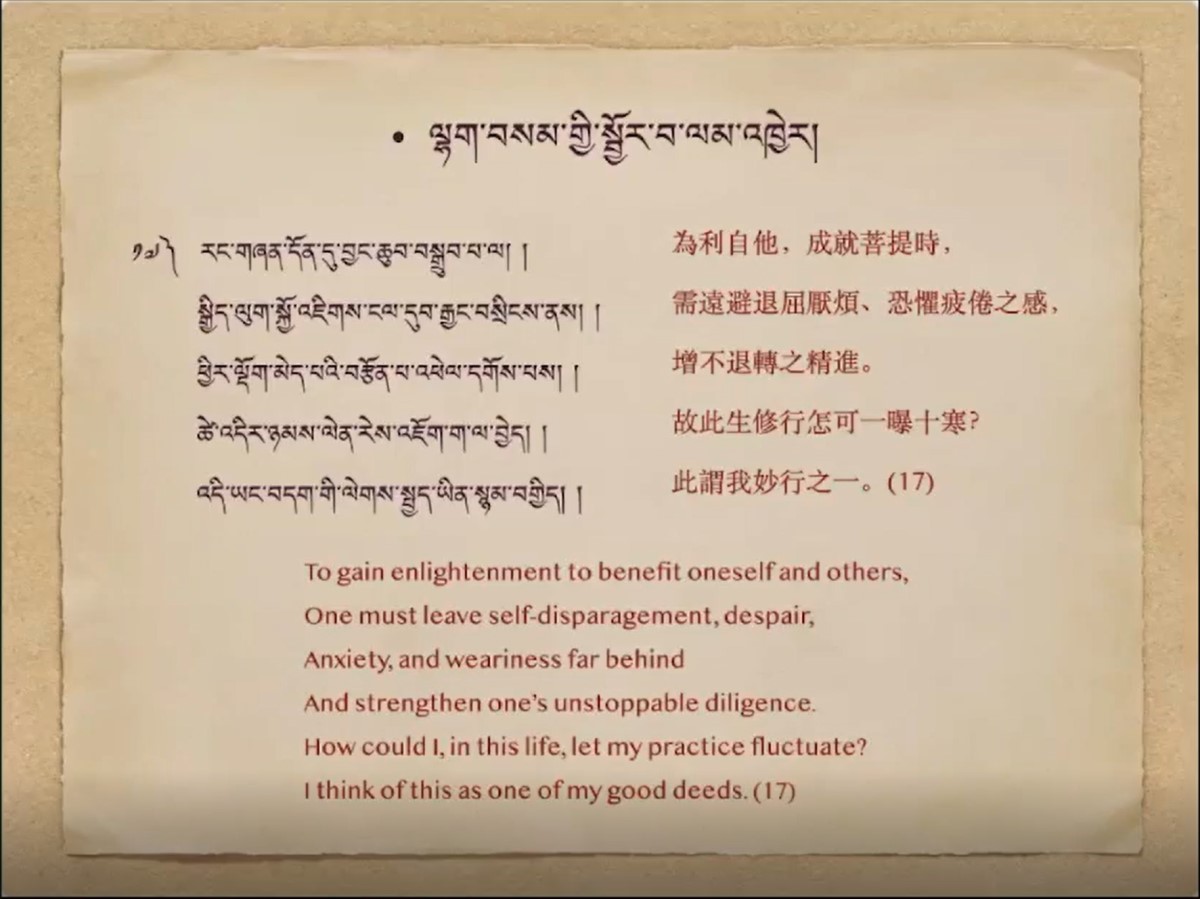
7. ལྷག་བསམ་གྱི་སྦྱོར་བ་ལམ་འཁྱེར།
Taking acting upon good intentions as the path
转清净行为道用
༡༧༽ རང་གཞན་དོན་དུ་བྱང་ཆུབ་བསྒྲུབ་པ་ལ། །
སྒྱིད་ལུག་སྐྱོ་འཇིགས་ངལ་དུབ་རྒྱང་བསྲིངས་ནས། ། ཕྱིར་ལྡོག་མེད་པའི་བརྩོན་པ་འཕེལ་དགོས་པས། ། ཚེ་འདིར་ཉམས་ལེན་རེས་འཇོག་ག་ལ་བྱེད། ། འདི་ཡང་བདག་གི་ལེགས་སྤྱད་ཡིན་སྙམ་བགྱིད། །
To gain enlightenment to benefit oneself and others,
One must leave self-disparagement, despair, Anxiety, and weariness far behind
And strengthen one’s unstoppable diligence. How could I, in this life, let my practice fluctuate?
I think of this as one of my good deeds. (17)
為利自他,成就菩提時,需遠避退屈厭煩、恐懼疲倦之感,增不退轉之精進。故此生修行怎可一曝十寒?此謂我妙行之一。(17)
《密勒日巴的传记》的补充
Returning to Milarepa
上一堂课中简略地讲过了,在讲解颂文之前,我想对于上一堂课中讲到过的密勒日巴尊者的故事,再做一些说明、补充。
Before explaining this stanza, His Holiness elaborated on the story of Milarepa from the previous teaching.
密勒日巴尊者的传记很多,其中最出名的就是藏涅•黑汝嘎所写的。平常我们说《密勒日巴传记》的时候,说的就是由他所写的这一部。
He explained that although there are many liberation stories of Milarepa, the most well-known one written by Tsangnyön Heruka.
但是,最古老的不一定就是藏涅•黑汝嘎所写的那一部。或者说历史最清楚的,源流最清楚的是普贤久昵所写的那一部,可以说最早的,
也是根据最清楚的,可以说是他的传记里最清楚的一部。(Bamboo:出名的都是盗版。)
the oldest and one of the best sources is The Twelve Great Students, prepared by twelve of his great disciples.
再来就是第三世噶玛巴让炯多杰的时候,编辑的密勒日巴传记,叫做《zu那巴》(音译)。所以,密勒日巴传记是有蛮多部的。
He added that there was also one called the Black Treasury, compiled by the third Karmapa Rangjung Dorje.
上一堂课谈到,尊者在他圆寂之前,就对弟子们说:
“在我死后,也没有什么有价值的财产给大家,这里就有一个黑紫檀木的拐杖,一顶布的帽子,还有一小块布,你们拿去给达波阿杰——冈波巴大师。”他就要弟子准备好。
When Milarepa passed away, he told his students, “I don’t have many important possessions to give away. Please give this black aloeswood staff, cloth hat, and piece of cloth to the Physician from Dakpo (Gampopa).
尊者也说,“当时我有跟惹琼巴说,在哪一天要回来。”
如果惹琼巴那个时候要回来的话,就有些东西给他。但如果他那时候回不来的话,有一个藤鞭,还有一小块布,就会留给他。”
If Rechungpa arrives on time, please give him these, and if he does not arrive, send him this walking stick and piece of cloth.”
平时,密勒日巴还有一个火镰,或者叫火刀,就留给直贡惹巴;他还有一个破的、褴褛的班智达帽,就留给斯沃惹巴;还有他披在身上的一块布,他就说,这块布分成碎片、小块,就分给其他的惹巴。
The flint and steel that Milarepa had used to light fires was reserved for Drigom Repa, and his tattered pandita hat was for Seben Repa. He also instructed his students to cut the cotton robe that he wore himself into pieces, and to give a bit to each of the repa.
同时,他还说,“我没有什么特别有价值的东西,可以给大家。但所有我给你们的东西,都是一种加持、一种成就。虽然没有太多物质上的价值,但是它是有加持的。”接着尊者说:“但我还是有一些黄金,这是我留存下来的,都藏在我闭关修持的房子后面有一面墙的缝隙里面。之后,你们可以取出来,
就分了。”
Milarepa then explained, “These are not of great monetary value, but they will bring each of you siddhis (accomplishments). Now, I do have a little bit of gold that I have saved up. I’ve hidden it in the back wall of my retreat hut, so after I’ve passed away, you should take it out and distribute the gold amongst all of the students.”
当时,大家听到说:有黄金,可以取出来把它分了。有些人就说:“是啊,以密勒日巴尊者这样身份的人,当然应该是有金子的吧。当然一般我们看尊者这样的修持,
连一件穿的衣服都没有,怎么会有金子?”所以,很多人听到密勒日巴这么说的时候,都觉得不可思议,也很怀疑。这时候,尊者就有一个弟子,就说:“怎么可能尊者会有黄金呢?
恶人就是管不好自己的嘴巴,乱说话就是造恶业。尊者是不可能有黄金的。”
There were various opinions regarding this, Karmapa elaborated. Some suspected that Milarepa must have had a lot of gold. Others exclaimed, “How could Milarepa have gold? He didn’t even have clothes that covered his entire body. Don’t listen to what others say; doing so will just end up in committing misdeeds.”
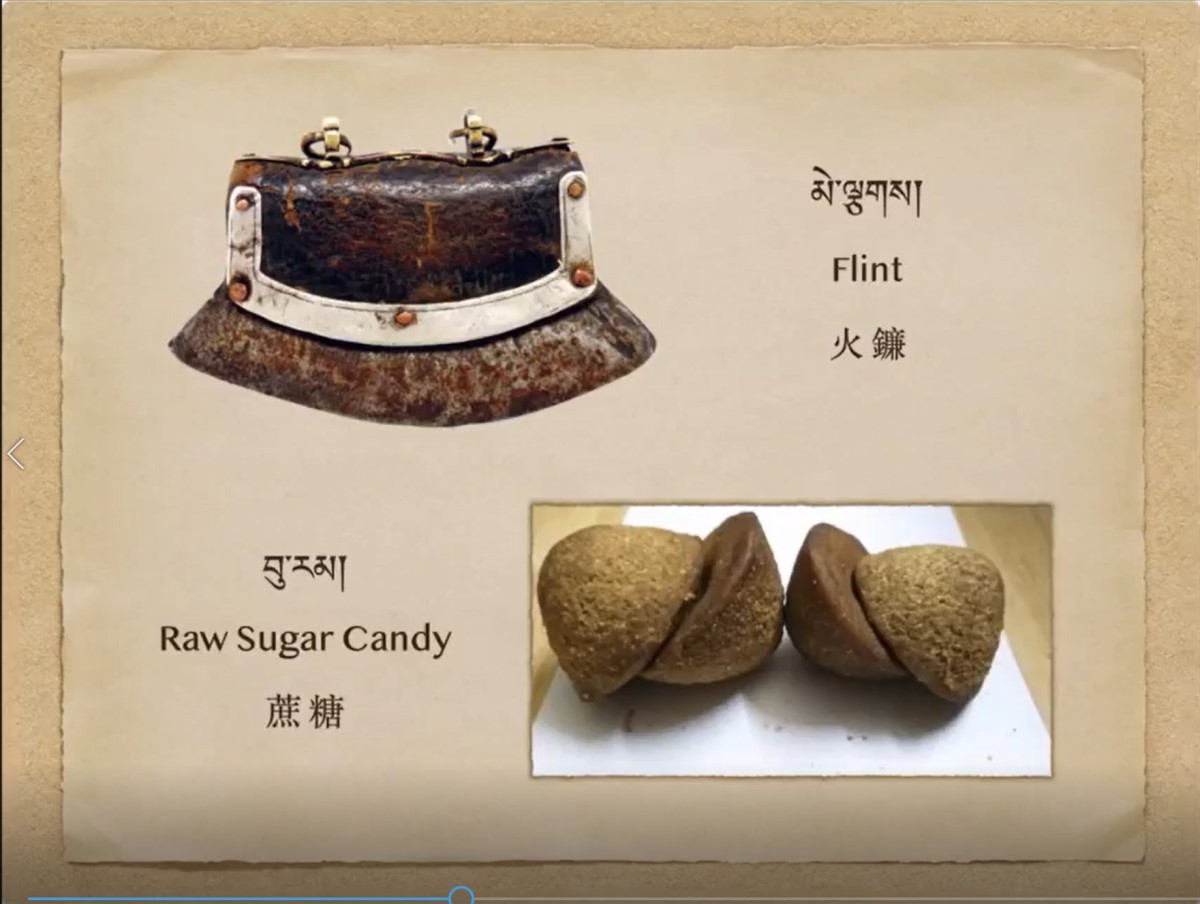
总之,尊者圆寂之后,弟子们就遵照尊者的遗嘱,就去埋藏东西的地方找金子。就发现有一个布包起来的东西。打开之后,发现没有任何金子。但里面有什么呢?有三小块蔗糖。还有尊者所写的一张纸条,还有一把火刀,或者说“火镰”。这个火镰不太一样,它又是一把刀,又有勺子的功能,同时又有像针的功能,所以是个有万用功能的火镰。
Later on, when the disciples gathered together to look for the gold, they found something wrapped up in cotton fabric. They opened it up and instead of gold, there were three pieces of jaggery [unrefined cane sugar], a letter from Milarepa himself, and a special multipurpose flint that could also be used as a knife, spoon, fork, and awl.
通常,如果是藏民,尤其是牧民,对于什么是火刀、火镰,或者蔗糖,大概都很清楚,但是听众可能不是很清楚。所以,这里我有准备照片给你们看一下。以前古代很常用的一个东西,
后来就变成一个装饰品。下面那个就是蔗糖,有三块蔗糖,就长成这个样子的蔗糖,大概是这样子半圆形的。大家可以知道是这个样子。所以平常的火镰是长这个样子,但密勒日巴的
可能又有点不太一样。因为他常常会到各个地方去点火,或者当勺子用,所以他的那个可以说是多功能的这样一个东西。
Karmapa then showed us pictures of a flint and jaggery. He explained that a flint was necessary while traveling, but later became used as an ornament. The lumps of jaggery were of a hemispherical shape, as depicted in the image shown.
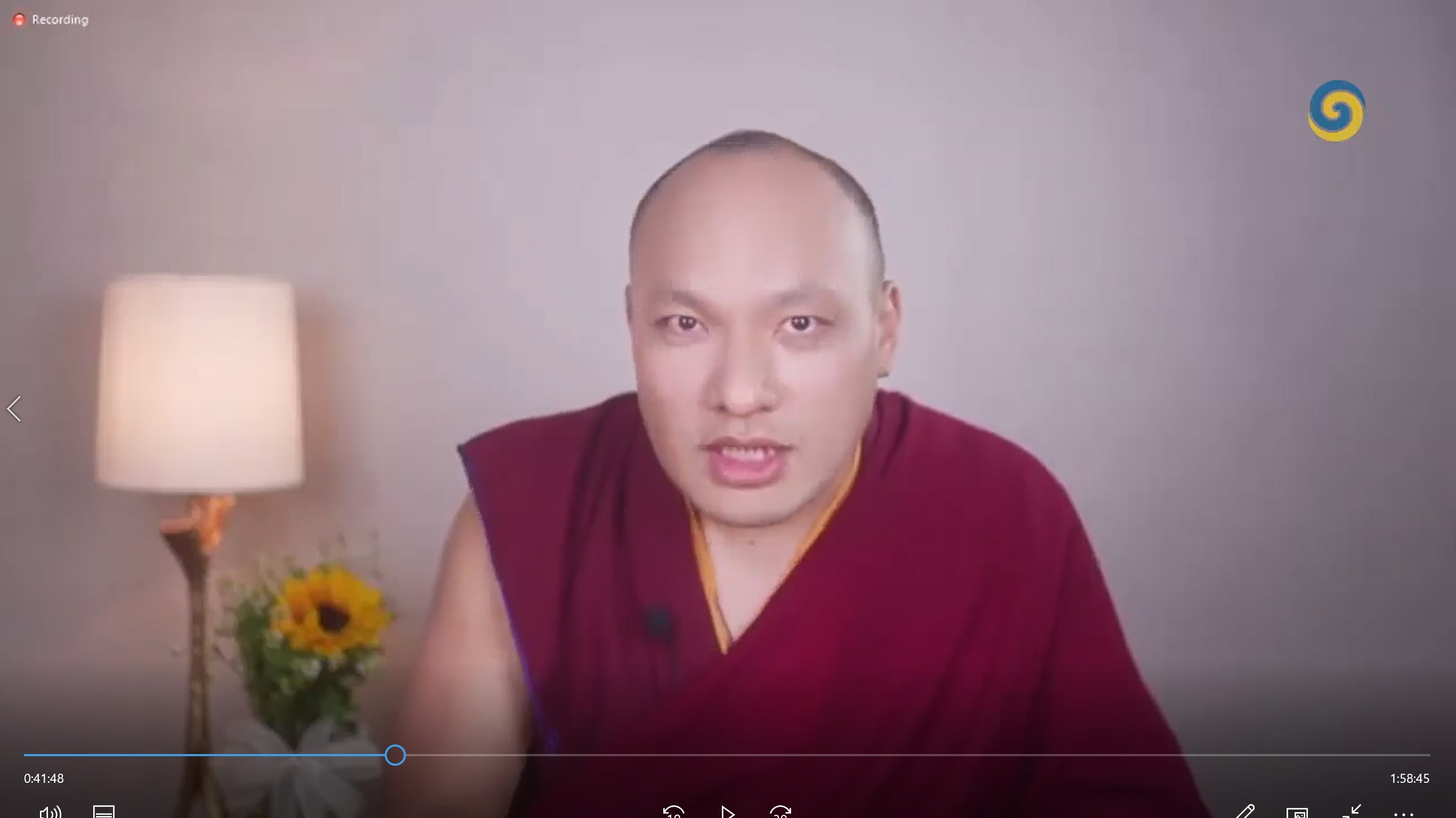
总之,他们把那个包袱打开之后,就发现这些东西,发现那个纸条,上面写了什么呢?写着:“你们呢,用刀把蔗糖给分了,每个人都能分到。那块布呢,也用那个刀给分了,只要还有人来取这块布的话,
这块布就可以一直分下去。”最重要的是,纸条后面一行字写道:“可能有人会说密勒日巴有金子,那些人呢,去吃屎吧!”有这样一段字。
When the students read the letter, it said, “Cut the jaggery with the knife and there will be enough for everyone. Cut this square cloth with the knife and distribute it; the cloth will not run out until there are no more people. There may have been people who said that I, Milarepa, had gold; so stuff their mouths with shit.”
当时,弟子们都很难过,因为密勒日巴才圆寂没几天。但是一看到后面这段文字,大家都笑了,心情也都比较开心一点。之后,弟子和施主们,大家就聚在一起,依照尊者说的话,分那个蔗糖。
Everyone had been grieving and sorrowful after Milarepa’s passing, but at that moment everyone laughed at the funny joke and felt lighter, pointed out Karmapa. After they finished the rituals for his passing away, all the students and sponsors gathered and divided the jaggery and cloth as instructed.
密勒日巴的神通
非常非常的特殊,他们在分的时候,三块嘛,每一块要切的时候,事实上,每切一块变成两半,不就是变小了吗,一切当然理所当然就变小。但是,一切变成两块,每块大小还是没变,跟原来那块一样。再切就变成四块了,再切,8块、16块,再切成32块等等,就越切越多,都切不完。
“It was really miraculous,” explained Karmapa. “When they cut the pieces of jaggery in half, the two pieces did not get any smaller. They were further split into four, and then into eight, the eight into sixteen, and the sixteen into thirty-two, but they never ran out. There was no end to the sugar.
然后,那块布呢,也是一样,中间这样子一切下去,结果那个布也没有变小,又变成是同样大小的一块布。同样也是一样,就变成4块、8块、32块,倍数增加。
Likewise, when they cut the square of cloth with the knife, the pieces of fabric didn’t get any smaller. Each of them was like a full square of fabric.”
所以,当时所有在场的每个人都有分到一块布和一块糖。
不仅是这样子,而且他们拿到那块糖的时候,想说“这是尊者给我们的一个加持的礼物”,马上要吃,就发现怎么吃都吃不完,怎么吃那块糖都没有变小。最后怎么办呢?就放在自己的包里、怀里。那些在家人就带回家,给家人吃,
结果还是一样,怎么吃都没有变少。那个地区叫“井塘”和“那釀”,密勒日巴圆寂的那两个地区的人,据说在一年当中都吃不完那个蔗糖。大家都说,从来没有吃过这么殊胜的蔗糖。 在尊者圆寂一年后,还有很多殊胜的情况,在他荼毘火化的地方,每次到了佛教节日的时候,天空都会放出美妙特殊的声音,当时也没有录音机可以播放,但是天空中就会出现这样特殊的妙音,而且还会降下花雨。当地的那些小孩子,小男生、小女生,看到花像雨一样降下来
就会去抓那些花朵,有些小孩抓到了,很高兴,就不给别人,抓了就赶快跑走。其他那些抓不到的小孩就赶快去追、去抢。总之,当时有很多这样特殊的事情。 有时候我们想想,为什么尊者圆寂之后留下来蔗糖和布?可以想象,尊者这样一个一贫如洗,比乞丐还贫困的一个人;就是在山上闭关的一个瑜伽士;一个什么财产都没有的一个人,但他最后竟然还特别留下了一点蔗糖和
他的衣服作为礼物,留给当地的人和他的弟子们,觉得说“如果你们想要纪念我,想到我的话,有一个东西当作纪念”。从这样的一个行为,你可以看到说:“哇~尊者的性格真的是好善良、很可爱。他总是会想到很多人,
会想到所有人。”一般修行人,我们总是会想到是一个很死板、很严肃,或者很倔的一个人。有时候想到修行人,就会是那个样子。但你看密勒日巴不是的,他会特别留下礼物和纪念的东西给别人。 他在圆寂的时候,说了
什么呢?在他最老的那部传记里提到什么呢?他就说:“在我圆寂后七天的时间内,你们不要碰我的身体,七天之后,我有话要跟你们说。”所以,大家都等着,圆寂之后七天不让人去碰。总之,第五天的时候,
很多人就实在是等不及了,怎么办?很想偷偷跑去看。但其他弟子说:“不行,不行,尊者已经说过了,七天内不要到我的身体旁边来打扰我,就是不要来看我。”但是很多弟子到第六天就等不及,他们就觉得一定要去看一看,
不然不知道发生什么事。结果一看之下,发现身体变得非常非常小,大概就这么小,一个手肘这么小。 当时很多弟子看到了不同的景象,有的说,看到的是观音菩萨。最后,弟子们都想,如果等到第七天的话,搞不好变成
虹光身,最后什么都没有留下。什么都没有留下来的话,那我们什么都得不到,也没有舍利留下,所以弟子们和施主们就决定荼毘火化。平常火化后会留下骨舍利,但是密勒日巴完全没有留下任何舍利,全部都像彩虹一样消失了,
什么都没留下来。平常烧遗体的时候,总是会有味道,但是密勒日巴完全没有味道,就像彩虹一样消失了。所以,火化完后什么都没留下来。一些说法是,他的遗体被空行母迎请走了。
那部分不多说,反正火化之后,什么都没有留下来。大家觉得说,没有任何一个可以留下来当供养、纪念、礼拜的东西。虽然尊者本来想说,七天之后他可以虹光身,但最后弟子们是火化了。但无论如何,他最后留下蔗糖和衣服,
他本来就准备要虹光身,不会留下任何东西。就先准备好衣服和蔗糖,留给大家作纪念的。这是我在想,这是一个原因,他为何要留下这些东西。 第二个原因,他说他有黄金这一段,他其实是在测试他的弟子,主要是看弟子们到底对他有多大的信心的一个试探。上一堂课没有讲得太清楚,所以今天再做一些补充。 Bamboo评论:大宝的言外之意就是:你看,米拉日巴尊者给上师当苦力的好处,就是获得了大神通自在之力。整俩胡罗卜,让Bamboo这头驴子远观一下。 米觉多杰他的行谊 第17个颂文主要讲的内容。那米觉多杰他的生平、行谊是怎么样的呢?就是很多人在名称上可能是在修行、在利他,这个米觉多杰他不太管,他主要在观察的,在乎的是本质上是在利他,还是在伤害别人。如果他发现
本质上对自己、对他人是伤害的,无论取的是什么样的一个名称,“利他”也好,“修行”也好,他都会停止那么去做,他自己不会那么去做。也因为他自己停止去做这些本质上伤害他人的表面上的“修行”和“利他”,而且那些
那些对于法王米觉多杰有信心的弟子和人,也会不去做这些本质上伤害别人的相似的、表面的善行。 在法王米觉多杰的《百段教言》中就有很清楚的这么一段话,他说:“如果能够直接利益到众生是最好,如果没有办法直接,
那么间接地利益众生,避免伤害到他们,这样子的话也是可以,无论说法、思维佛法、修持佛法、建立僧团、建立寺院、兴建佛塔、佛像等等。所有的修持都能够成为成佛的因。除此之外,如果发心不是为了利益众生,或者,就算
有这样的发心,但是在行为上却对众生造成了伤害的话,这些相似的闻、思、修,或者累积福德的行为,实际上还是无法成为成佛的因,所以都应该很聪明地、方便地停止这么去做。” 所以,米觉多杰真正在乎的,和观察的
是实际上是不是真的做到在修行,是不是在自利利他,他不看表面的。他在学习和思维任何显、密教法的时候,他同时也在不断地修持显、密教法。当他在认真修持显密的时候,同时,也增进了他的闻、思。换句话说,也打破了
显、密闻思的界限。所以,他的闻思增长了他的修持;他的修也增长了闻思,他的闻思修是相辅相成的,不会一个障碍到另一个的。
Everyone there got a piece of jaggery and a piece of the fabric. They immediately started to eat the jaggery, as they felt it must have great blessings from Milarepa. No matter how long they ate it, the piece of jaggery never ran out. People took them back to their homes for their family members, but the pieces never got any smaller.
Everyone in Dring and Nyanam, the region where Milarepa passed away, was able to eat the jaggery for a whole year. This became renowned and people exclaimed, “There’s nothing more amazing than these pieces of jaggery!”
There are many other events related to that. Karmapa said, “For a year after Milarepa’s passing, there were always beautiful melodies and rains of flowers coming from the sky on auspicious days at the cremation site. The little boys and girls ran off to catch the flowers, and the ones who caught flowers were chased by those who did not.” 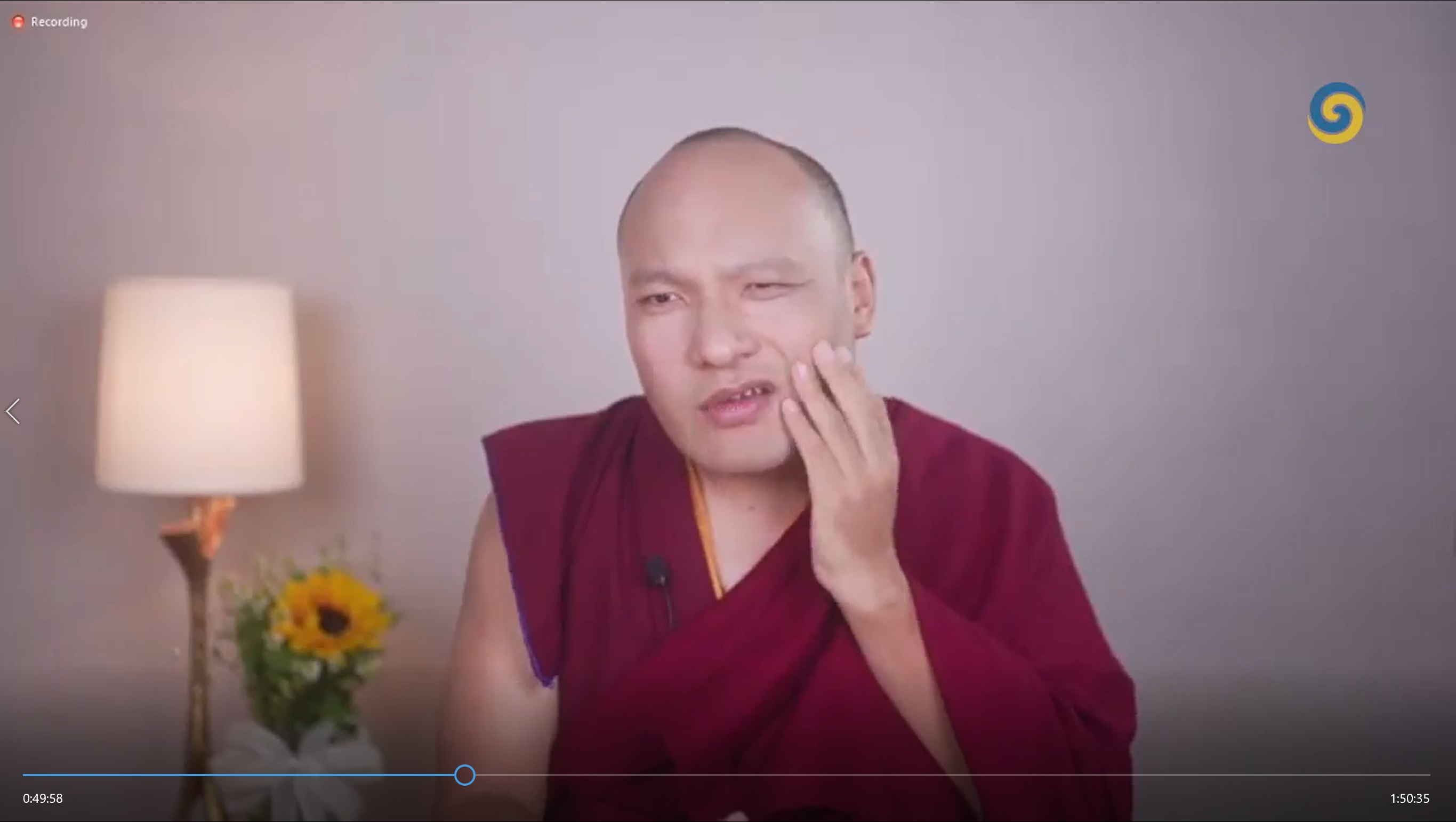
Even though Milarepa, worse off than most beggars, did not have any possessions of value, he gave the jaggery and fabric as gifts to everyone with whom he was connected. It was like a souvenir, a support for them to remember him by. His Holiness remarked that from this, we can tell how Milarepa was kind and always thinking of other people. “This shows that being a practitioner does not mean having a rigid, inflexible character. Some practitioners are like that, but Milarepa was not,” he explained.
According to old liberation stories, Milarepa said, “After I pass away, don’t disturb my body for seven days. I will have something to say after that.” His students followed instructions and waited. When it came to the fifth day, some people could not wait and wondered what might have happened, but the disciples would not permit them to take a look. Eventually, they went in on the sixth day, and discovered that Milarepa’s remains had become very tiny, around one cubit in size.
At that time, many people had different visions; some saw it as Chenrezig, some felt it was a vase. Afterwards, they all thought, “If we leave him alone, there won’t even be any remains left, and we won’t have any relics or other supports for faith to worship.” So everyone decided to cremate the remains. Karmapa expressed that usually relics appear during cremation, but there was nothing left at all—the remains had disappeared, like rainbows. Neither was there the normal smell of burning flesh during the cremation.
It seemed like Milarepa intended to not leave any remains or relics, and left the jaggery and fabric as a support for faith. His Holiness believed this is one reason for his leaving those objects.
When Milarepa said “I have gold,” it showed that he was no different on the outside or the inside. “He did not have any attachment to sensory pleasures, and that was the type of practice he did. After he had passed away, there was nothing to be found. Saying he had gold was a test to see how much belief his students had in him,” explained Karmapa.
Mikyö Dorje’s Genuine Practice
Returning to the seventeenth of the good deeds, Karmapa explained that the way Mikyö Dorje performed his activities was to give up doing things that were called “practice and study of sutra and tantra” but that in actuality harmed oneself and others. Leading by example, he became a cause for his receptive students to also stop doing non-virtuous or neutral things that outwardly appeared to be virtuous.
Mikyö Dorje himself also stated very clearly:
It is best to benefit sentient beings directly. If you cannot, then focus on benefiting sentient beings indirectly, beginning with not harming them. Do whatever you can to teach dharma, contemplate dharma, meditate on dharma, gather monks, sustain monasteries, and build stupas and statues. If you do all that you can, all your intentions and actions will become causes of achieving great enlightenment.
If you do not have the thought to focus on the benefit of sentient beings from the beginning, or even if you do but your actions begin to harm sentient beings during the engagement, all your listening, contemplating and meditating on the dharma and seeming accumulation of merit will not be causes of buddhahood. It will not bring you liberation and omniscience, so you need to stop doing them.
不然有时候你们看,我们会说闭关中心、佛学院是分开的,注重闻思的是佛学院;注重实修的是闭关中心,一般说,为什么要分开这两个事业单位?主要是因为闭关中心强调实修;强调闻思、教育这部分是在佛学院。
这可以说是,你在专注培养这种专业,所以你有这样一个单位,分开两个地方,是为了培养这样的专业。这是一方面来说,但另外一个方面来说,好像也给人一种感觉:你在佛学院就不用去实修;专注在实修,你就不用做到
闻思,好像把它两个分开了。因为它是分开的两个单位嘛,会给人这样一个误解。
These days, we have a separate monastic college for studying, and a separate section for doing pujas. Karmapa remarked that from another perspective, it is as if one person cannot do both well, so we had to separate the two.
Bamboo:人家搞这些佛学院、闭关中心,又不是为了闻思和修,都是为了骗人、骗财方便而已。跟缅甸的电信诈骗团伙其实是一伙人,无非是取了个佛法上的名称罢了 ,方便把佛教徒拐进坑里而已。
但法王米觉多杰那个时候的藏地,可以说是末法时期,...弟子也都是很难调伏的时候,他还是带着善心和清净心利益众生。他在持戒的时候,也让布施的善得到了增长;布施的时候,也让持戒的善得到了增长。所以,
他所有的修持都是相辅相成,而不会相互的妨碍。
Mikyö Dorje’s time was, in Tibet, a degenerate era; people were very difficult to tame or subdue. When he was keeping discipline, the virtue of generosity increased, and when being generous, the virtue of discipline increased. “They each benefit and contribute to each other; it’s not like you emphasize one and forget about the other,” explained Karmapa.
他一生当中“利他”的行持,无论是闻、思、修也好;“三学”的修持也好;或者讲说、辩论、著作;或者为别人传戒:别解脱戒、菩萨戒、密乘戒;还有他为别人灌顶、授课、口传;
或者为别人加持,或者是唱诵道歌;或者是七支供养;或者就是祈愿等等,总之,米觉多杰在做任何这些自利利他的修持时,他都不会拖延和懈怠。他会都具备一种不退转的精进,不会想说今天休息,明天再做。
Likewise, when Mikyö Dorje was practicing listening, contemplation, and meditation; giving pratimoksha or bodhisattva vows, empowerments, instructions, reading transmissions; reciting the seven branch prayer or other aspirations—no matter what he was doing, he would not procrastinate. He never felt discouraged and thought “I can’t do this physically or mentally,” but had the confidence and enthusiasm to accomplish them.
他也具备了
一种勇气,从不会觉得有什么事情是我身、心无法做到的。他遇到任何挑战的时候,他都能够忍受这些痛苦,都能够面对,都能够完全地克服这所有的挑战。(Bamboo批:克服到被人骂死了。)他也将所有的行持都回向成就
菩提。而且是具备了三轮体空的禅定力来做这种修持,无论他在行住坐卧的所有行持当中,都不离大菩提的见、修、行。所以,他所有的修持都成为了利他。还有当他看到别人...,他也会提示和指导别人,怎么样正确
地取舍,怎么样才是真正地利他。他自己也都从来没有失去过这种清净的修持。所以,他的修持不会是“闻思的时候就没有修持”,他听闻、听课的时候,就帮助了他的修持;或者他在修持的时候,就会帮助他的听闻和思维
等等;还有他任何的修持都不会被任何的外缘中断;还有他任何的修持都会成为利他的意义,这可以说是米觉多杰很特殊的行谊,具备了这样特殊的示现。
His Holiness explained that regardless of how many adversities had occurred, Mikyö Dorje had the patience and equanimity to face and overcome them. He dedicated all he did to bring all sentient beings to enlightenment; these were dedications free of the three spheres, imbued with the realization of emptiness. “Even when he was doing regular things like walking around and lying down, he was never free of the view, meditation, and conduct of great enlightenment. All his actions were focused on the sake of the teachings and sentient beings,” said Karmapa.
还有米觉多杰他的佛行事业很广大,平时他会讲法,他也会著作,他也会跟很多人谈话,有时候也会跟别人讲话开玩笑,喝茶,有时候也会有人请示他一些问题,他会给予一些指示;到了傍晚的时候,他修持的时候,会
做很多的祈请、课诵、唱诵道歌等等。平常任何一个人,你会觉得有这么多事情要做,会忙不过来,做了这个就会拉掉了另外一个,但是米觉多杰从来不会是这个样子。他每一个作为都不会障碍到另外一个,而是相辅相成的。
不止是著作,任何他写的东西,像是信件啊,就有一百多篇,一百多部,可以说米觉多杰他是非常地精进的,为了众生、为了佛教,他都在日夜不懈地这样做着。
No matter what Mikyö Dorje did, whether giving teachings, writing, conversing and joking, drinking tea and eating meals, giving advice, or reciting prayers and meditating in the evenings, he performed them well without letting any of these actions interfere with one another. He made people understand the right and wrong ways to benefit others, and he himself never mixed them up in his practice. With writings alone numbering over one hundred volumes, Mikyö Dorje was incredibly diligent, working night and day to benefit sentient beings.
好,接着我们休息半个小时。
Facebook 视频
